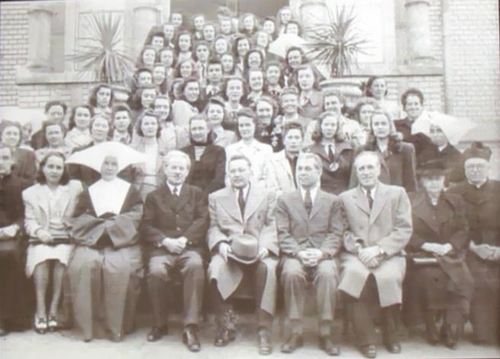 français français magyar magyar deutsch deutsch |
Talking with Angels
{ documents } |
 français français magyar magyar deutsch deutsch |
Talking with Angels
{ documents } |
|
Gitta Mallasz, Righteous Among the Nations In 2011, Gitta Mallasz was posthumously awarded the title of “Righteous Among the Nations” by Yad Vashem World Holocaust Remembrance centre for saving hundreds of Jewish women and children while commanding Katalin’s military uniform factory in Budapest in 1944. On May 13, 2012, the medal and the title of “Righteous Among the Nations” were awarded to her great-niece, Andrea Mallasz, during a ceremony organized at the Collčge of Bernardins in Paris by Yad Vashem.
This
distinction is the result of Monique Guillemin’s initiative, who
nominated Gitta and assembled the necessary documentation to present to
Yad Vashem. She was assisted in this task by Imre Bóc, who recounts
their journey in this document: The key witness Susan Kis
was in Katalin with her mother at the time and was able to flee with
her on 1 December 1944. She returned there with a Hungarian filmmaker
in 2006 to tell the story. The former convent now houses a Jewish
school.
Excerpt from the
film Múltbanézők (Back
to the past) by Andras S Takacs.
(In Hungarian with English subtitles) Two more
testimonials have been discovered since 2011.
The first one originates from Erszébet Rusznyak’s son who was 8 years old in 1944. The second one is an extract from the book ‘Erbstein, the triumph and tragedy of football’s forgotten pioneer’, which tells the story of football coach Ernö Erbstein, whose wife and two daughters were in Katalin at the time. Andreas Rusznyak’s testimony : “I remember that, on the
day of the
Arrow Crosses first raid, it was
daylight and the weather was mild and
sunny. That was surprising, because it was November 5, and it was
normally already cold by that date in Budapest. Us kids had given a
codeword to various locations in the grounds. When we saw armed men
coming, we shouted the codeword for the hole in the fence at the top of
the estate. Very quickly I ended up outside with two little girls and
we wondered what to do. One of the girls knew someone in the
neighbourhood. To avoid giving the impression of being lost, we started
looking for this house as if we knew where it was. When we couldn’t
find it, we rang a doorbell at random. A woman answered the door and
asked us where we came from and what our names were. After hesitating,
we told her the truth. Luckily it turned out that this woman was my
grandfather’s assistant! She arranged for us to go back to Katalin once
the danger had averted. I can’t remember if it was the same day or the
next morning. The forced march to the Budapest ghetto, which was
finally halted, indelibly traumatized my older sister.”
The Erbstein family’s testimony : Ernö Erbstein was
a Hungarian Jew
known to have coached the Turin football team. His wife and two
daughters stayed in Katalin from July to November 1944 and experienced
the horrors of the first Arrow Crosses arrests. According to Susanna’s
testimony, the elder of the two daughters who was 20 years old at the
time, it was her father who alerted the nunciature and allowed the
nuncio to intervene to stop the convoy.
Extract published by The Guardian, from the book Erbstein, The Triumph and Tragedy of Football’s Forgotten Pioneer, Dominic Bliss, Blizzard Books (2014). Father Paul Klinda’s role in the rescue of Jewish women and children Father Paul Klinda
(1903-1945) was
mandated by the military authorities in March 1944 to set up a factory
to make army clothes. He established it in the Home for Girls which was
a part of the technical college he had founded in 1933 and obtained the
Vatican’s protection. In June 1944, he recruited Gitta Mallasz as
director of the establishment, which housed 103 people at the time.
Paul Klinda was awarded Righteous Among the Nations status in 1995. His decisive role was outlined by the Hungarian historian Beke Margit in an article published in 2015 : A Boldog Katalin Nagyleányotthon a nunciatúra oltalma alatt, Klinda Pŕl atya személyes archivuma alapjŕn. French translation : Le Foyer de jeunes filles Catherine la Bienheureuse sous protection de la nonciature  The Boldog Katalin girls’ home before it was turned into a military uniform factory. Photo taken from the film Múltba nézők (Back to the past) by Andras S Takacs Translated by
Treharne Translations
|